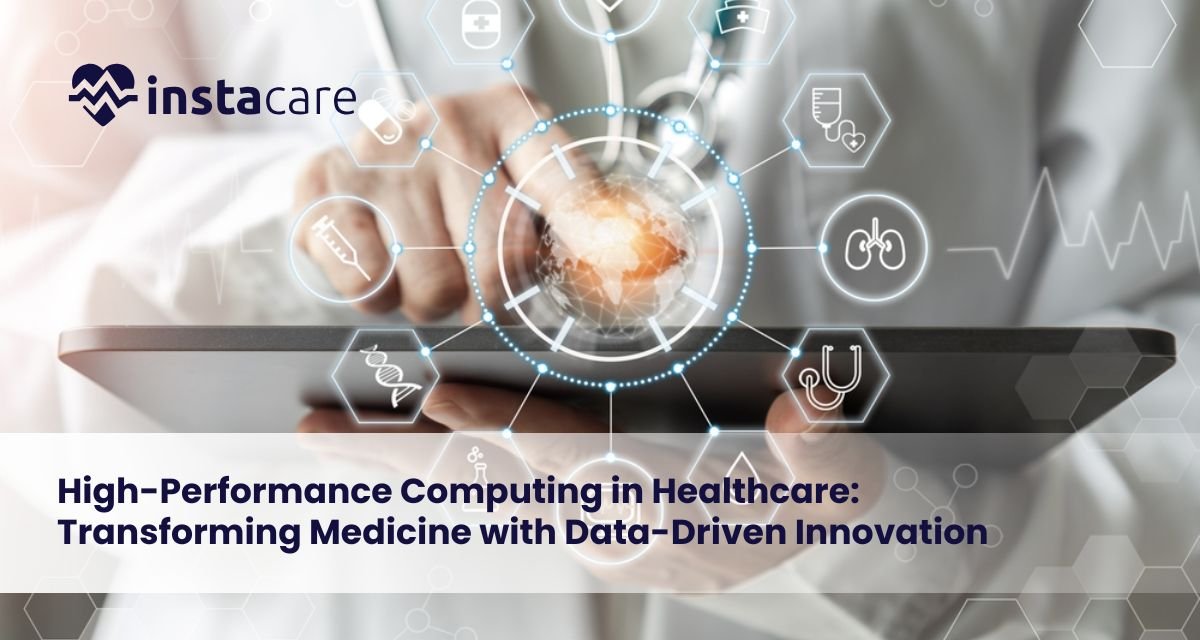Last updated on Wednesday, 1, October, 2025
Table of Contents
High-Performance Computing in Healthcare: Transforming Medicine with Data-Driven Innovation
The healthcare sector is witnessing a computing revolution. Right from the human genome mapping to the design of life-saving drugs in history-making time scales, HPC has been the unseen force behind the most glorious developments in medicine today. With healthcare generating more data than ever before, the ability to analyze and process it has become the machine needed for more medical research and patient treatment.
What is High-Performance Computing (HPC)?
High-performance computing is the use of parallel processing principles and supercomputers to deliver solutions to computationally intensive problems at rates several orders of magnitude quicker than standard computing hardware. A standard computer is only capable of having a single processor, yet an HPC system has thousands or millions of processors that run concurrently to carry out enormous calculations.
These supercomputers in healthcare research are petaflop speeds (quadrillions of calculations per second). Modern HPC environments include on-premises supercomputing, cloud-based HPC solutions for healthcare, and hybrid models combining the two methods, offering computational power to small- to large-sized institutions.
“High-performance computing has become the backbone of modern medical research, enabling discoveries that were impossible just a decade ago.” – Healthcare Technology Expert
Applications of HPC in Healthcare
HPC in Genomics
The human genome consists of approximately 3 billion base pairs, and information from a single sequenced genome yields over 200 gigabytes of raw data. HPC in genomics enables scientists to compare a thousand genomes simultaneously and determine patterns of drug response variability and disease susceptibility rapidly.
High Performance Computing for Drug Discovery
Traditional pharmaceutical development is a billion-dollar, decade-long endeavor. High performance computing for drug discovery enables hundreds of millions of potential drugs to be virtually screened against disease targets. Scientists utilized HPC to model the COVID-19 virus spike protein structure and screen for candidate therapeutic compounds—accelerating years of effort into months.
HPC in Medical Imaging
HPC in medical imaging provides instant image reconstruction and sophisticated analysis that detects minor abnormalities beyond human vision. Machine learning software processes dozens of medical images on HPC infrastructures to learn disease patterns and diagnoses to become more precise with virtually zero interpretation time.
HPC for Disease Modeling
HPC for disease modeling facilitates the simulation of disease transmission across populations and testing intervention methods. Such models employ a variety of variables in creating realistic situations that have the capacity to affect effective policy action towards public health emergencies.
HPC for Precision Medicine
HPC for precision medicine takes genomic information, electronic health records, environmental exposures, and response to treatment, and uses this to establish the ideal treatment for an individual patient. Personalized medicine requires huge amounts of data to be processed to identify biomarkers, treatment response, and identify appropriate clinical trials for patients.
By scrutinizing patient information thoroughly, HPC systems help doctors select the best available therapy with the least side effects. The technology allows for on-the-fly analysis of the genetic variations that influence drug metabolism so that doctors can adjust dosages and select drugs based on patients’ unique profiles. Precision medicine is realized as a clinical reality because of this.
Benefits of HPC in Healthcare
The benefits of HPC in healthcare are transformative. Computation speed makes it possible to analyze taking months to run in hours or a few days. HPC computers can process tens of thousands more parameters than standard approaches, leading to more accurate prediction, diagnosis, and treatment. Being able to analyze the whole dataset rather than samples removes bias and increases statistical power.
While infrastructure is expensive, HPC ultimately pays for healthcare by accelerating drug development, streamlining diagnosis, and enabling treatments for prevention. Virtual screening and simulation reduce expensive physical tests and clinical trials considerably.
HPC for medical research promotes global collaboration, with researchers able to share computational resources and data. Arguably most significantly, HPC for big data in healthcare offers the only feasible answer to the huge datasets created by contemporary medicine, so 30% of the world’s volume of data is created in healthcare.
Book Your Free Marketing Consultation
Challenges and Limitations
As vast as its potential is, the challenges of HPC in healthcare are enormous. Multimillion-dollar annual capital investment in supercomputer specialty facilities is necessary. Operation of the HPC platforms necessitates computational science expertise and healthcare expertise blended together a combination as rare as it is necessary and thereby producing a human resource shortage.
Data privacy is still a concern, i.e., HIPAA and GDPR compliant cloud solutions. Supercomputers are humongous power guzzlers with their carbon footprint. Medical data will not be normalized and error-ridden, and requires heavyweight pre-HPC analysis scrubbing. Ethical issues of algorithmic bias and prediction exploitation of data necessitate cautionary governance solutions.
Future of HPC in Healthcare
The future of HPC in healthcare is filled with amazing breakthroughs. Combination with quantum computing has the potential to revolutionize drug discovery with the capability to simulate molecular interactions with an accuracy hitherto unimaginable. Combination with clinical high-performance computing in AI in healthcare will similarly continue to accelerate to make achievements in diagnostic and treatment planning.
Edge computing can de-localize compute resources close to data sources enabling in-care real-time analysis. HPC solutions in the cloud will continue to provide access for smaller organizations to participate in leading research. Future HPC systems will enable “digital twins”−computer surrogates for patients used to forecast treatment outcomes before application. Future systems will be low-energy in green energy and optimized architecture.
Conclusion
High-performance computing has evolved from a specialized research setting to a fundamental pillar of healthcare. The HPC applications in healthcare are transforming medicine with sped-up drug development, tailored treatments, improved diagnosis, and disease simulation. With expanding innovation and availability, HPC will become a critical part of healthcare provision. Further investment into HPC hardware will have direct implications for better health outcomes, faster treatments, and indeed, lives saved.
FAQs
Q: In what way does HPC differ from healthcare cloud computing?
Cloud computing provides on-demand access to the hardware, whereas HPC is specifically designed for large-scale parallel processing. Cloud HPC makes use of both.
Q: Can small health organizations utilize HPC?
Yes. Pay-per-use supercomputing is being offered by cloud HPC services, removing the cost of infrastructure for small organizations.
Q: What security features protect patient data within the HPC system?
HPC systems apply encryption, access controls, audit trails, and healthcare regulation compliance certifications like HIPAA and GDPR.
Q: What proportion of healthcare organizations’ return on investment is derived from HPC?
Studies have shown that for every dollar spent on HPC for clinical research, there is a $10-30 return on economic and health value, though this varies depending upon usage.



